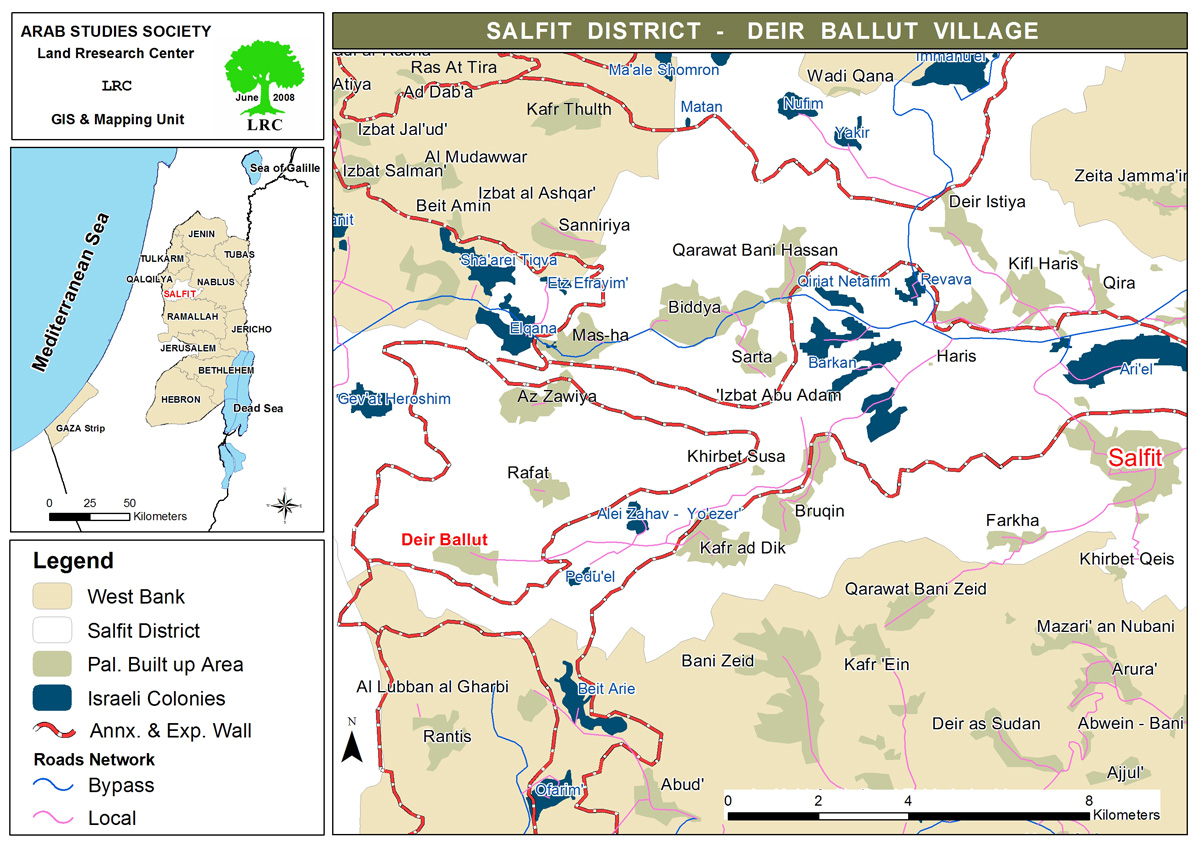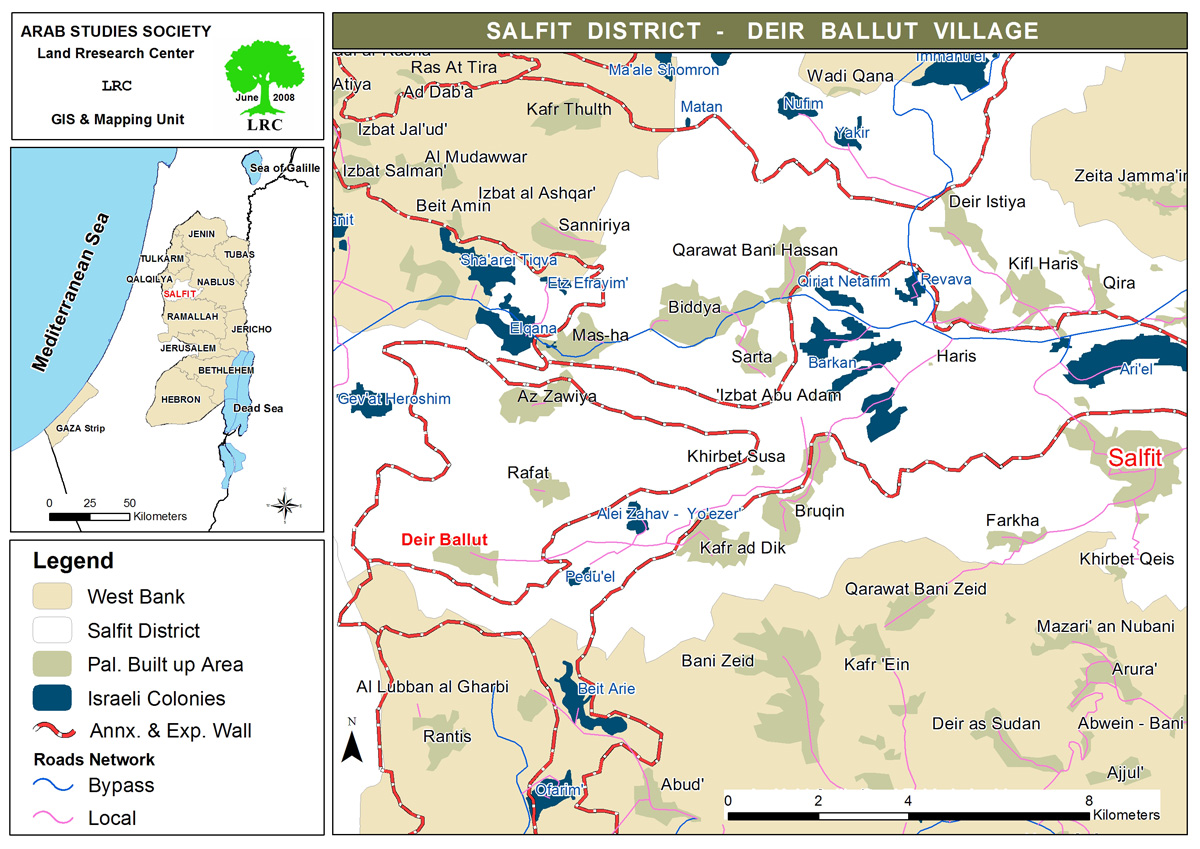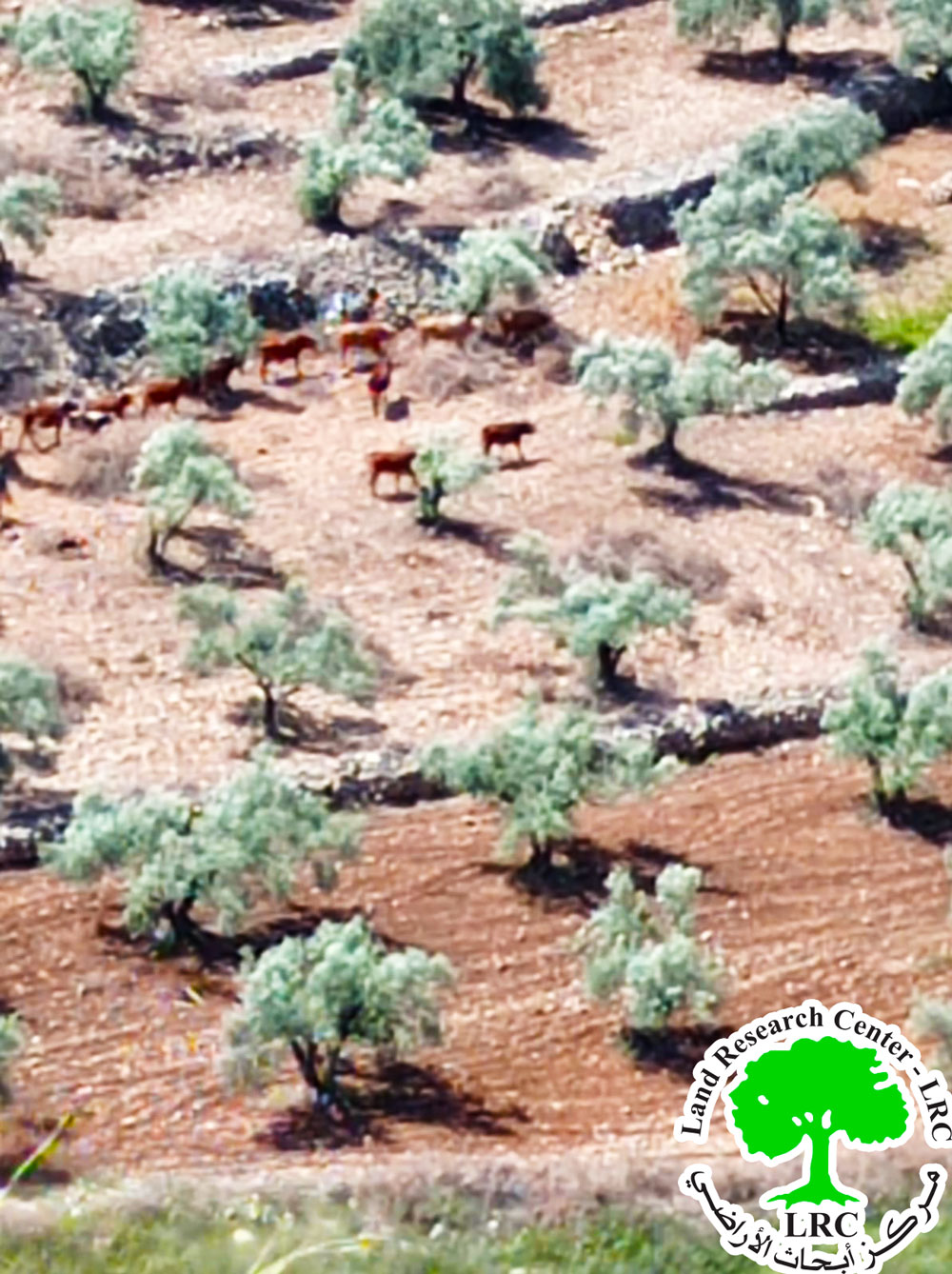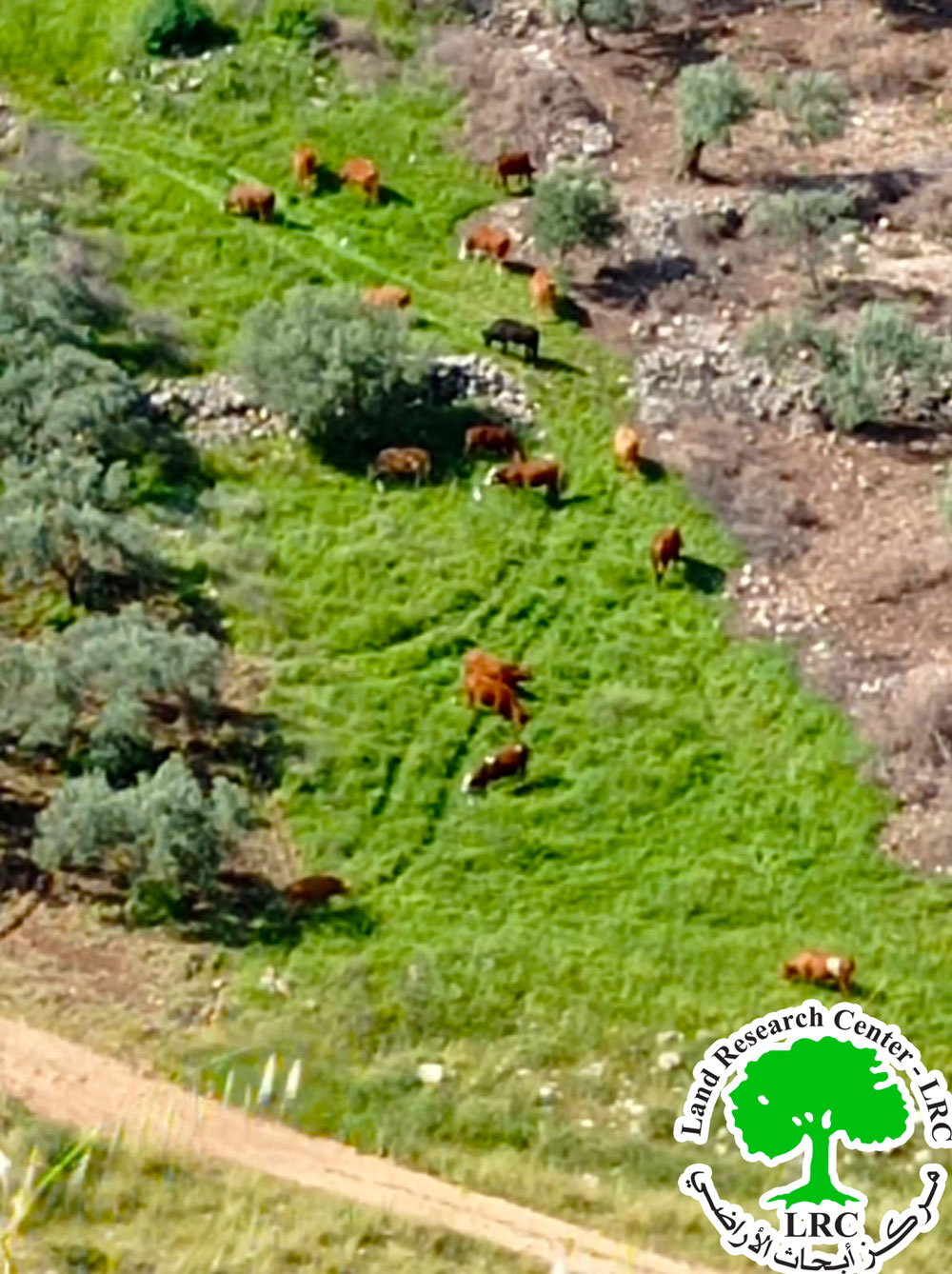أبقار المستعمرون تدمر 25 شجرة زيتون في وادي دير بلوط بمحافظة سلفيت
الانتهاك: رعي أبقار في حقول زيتون.
- الموقع: وادي دير بلوط / محافظة سلفيت.
- تاريخ الانتهاك: 01/04/2024.
- الجهة المعتدية: المستعمرون.
- الجهة المتضررة: المزارع رياض خليل عبد المجيد يوسف.
تفاصيل الانتهاك:
أطلق المستعمرون يوم الاثنين الموافق (1/4/2024)م، عدد من رؤوس الأبقار في أراضي المواطنين بوادي بلدة ديربلوط الواقع في الجهة الجنوبية الغربية من البلدة، مما أدى الى رعي وتخريب عدد من أشجار الزيتون في تلك الأراضي، والتي يبلغ عمرها من يزيد عن 25عام، ما أدى الى تخريب ( 25 شجرة).
وتعود ملكية الأشجار المتضررة الى المزارع رياض خليل عبد المجيد يوسف، المعيل لأسرة مكونة من (6) أفراد من بينهم (3) اناث وهناك طفل واحد ضمن العائلة.
أبقار المستعمرين في أراضي المواطنين – وادي دير بلوط
وقد أفاد المزارع المتضرر لباحث مركز أبحاث الأراضي بالتالي:
" منذ إقامة البؤرة الرعوية الاستعمارية على أراضي قرية اللبن الغربية المجاورة لبلدتنا ونحن في صراع مرير مع المستعمرين، حيث يتعمد المستعمرين بشكل يومي إطلاق قطعان الأبقار التي يمتلكونها صوب أراضينا المشجرة بالزيتون المثمر، مما أدى الى قيام الأبقار برعي أغصان الأشجار والحاق ضرر جزئي بها، وقمنا نحن المزارعون في البلدة بالتوجه الى الأرض أكثر من مرة، وقمنا بالتواصل مع الارتباط المدني الفلسطيني، وحصلنا على وعودات من قبل جيش الاحتلال بمنع دخول المستعمرين الى أراضينا، ولكن فعلياً لم ينفذ هذا الأمر، وعلى العكس لاحظنا وجود الأبقار في الأرض أكثر من مرة وهي تقوم بتخريب الأشجار".
ويأتي أسلوب المستعمرين في إطلاق أبقارهم في أراضي المزارعين بهدف التضييق عليهم واتلاف الأراضي الزراعية والحاق أكبر ضرر فيها، في ظل محاولة المستعمرين التمدد وتوسعة البؤر الرعوية هناك.
تعريف ببلدة دير بلوط:
تقع قرية دير بلوط على بعد 24كم من الجهة الغربية من مدينة سلفيت، ويحدها من الشم القرية رافات ومن الغرب الخط الأخضر – الأراضي المحتلة عام 1948- ومن الشرق قرية كفر الديك ومن الجنوب قرية اللبن الغربي.
يبلغ عدد سكانها (3,873) نسمة حتى عام (2017)م، حيث ينتسب سكان البلدة إلى 9 عائلات هي: تفاحة، خير، عبد الله ، قاسم، قرعوش، مسحل، مصطفى، موسى وهدروس.
تبلغ مساحتها الإجمالية 11,399 دونم، منها 503 دونم عبارة عن مسطح بناء للقرية.
هذا ويقام على أراضيها من الجهة الشرقية ( مستوطنة هار إيلي زهاف ومستوطنة بدوائيل)، حيث صادر الاحتلال من أراضيها ما مساحته (436 ) دونم وفيما يلي التوضيح:
نهبت مستعمرة “هار ايلي زهاف” 190 دونماً من أراضي القرية، حيث تأسست عام 1983، ويسكنها 3119 مستعمر حسب إحصائيات : وزارة الداخلية الإسرائيلية – 3 كانون ثاني 2019
نهبت الطريق الالتفافية رقم 446 ما مساحته 127 دونم.
هذا ويقام الجدار العنصري على أراضي القرية حيث ينهب تحت مساره ( 119) دونم، ويعزل (895) دونم. ويبلغ طوله ( 1,189) متراً. وفي حال استكمال الجدار المخطط على أراضي القرية سينهب تحت مساره ( 670 ) دونم ، وسيعزل (2,613) دونم. وسيبلغ طوله ( 6,695 ) متراً)
تصنف أراضي القرية حسب اتفاق أوسلو:
– مناطق مصنفة B (689) دونم.
– مناطق مصنفة C (10,710) دونم.
التعليق القانوني:
إن البيئة الفلسطينية عامةً تتعرض لانتهاكات بيئية عديدة من قبل الاحتلال الإسرائيلي، ضاربة بعرض الحائط كافة القوانين والأعراف الدولية والوطنية المتعلقة بحماية الحقوق البيئية، وإن الحق بالعيش في بيئة نظيفة وسليمة هو حق لصيق بالإنسان منذ الخليقة. ودائماً ما يحاول الاحتلال الظهور بمظهر الحريص على الشؤون الدولية البيئية على الرغم من توقيعها على اتفاقيات كبرى لحماية البيئة أبرزها اتفاقية بازل عام1989م واتفاقية روتردام عام2008م واتفاقية ستوكهولم2001م واتفاقية رامسار عام 1971م، وكذلك مواثيق جودة الهواء والمناخ ورغم ذلك تقوم بانتهاك جميع هذه المعاهدات دون محاسبة أو مراقبة.
بالإضافة إلى النصوص الخاصة بحق التمتع ببيئة نظيفة وسليمة لكل من يقع تحت الاحتلال العسكري بحسب القوانين والمواثيق والمعاهدات الدولية، كالعهد الدولي الخاص بالحقوق الاقتصادية والاجتماعية والثقافية بموجب قرار الجمعية العامة للأمم المتحدة 2200 ألف (د-21) المؤرخ في 16 كانون الأول / ديسمبر 1966 في المادة (1) البند (2): "...لجميع الشعوب، سعياً وراء أهدافها الخاصة، التصرف الحر بثرواتها ومواردها الطبيعية دونما إخلال بأية التزامات منبثقة عن مقتضيات التعاون الاقتصادي الدولي القائم على مبدأ المنفعة المتبادلة وعن القانون الدولي. ولا يجوز في أية حال حرمان أي شعب من أسباب عيشه الخاصة...".
ومما لا شك فيه أن الاعتداءات التي يقوم بها الجانب الإسرائيلي تخالف قوانين "دولة الاحتلال" قبل غيرها من القوانين، وبالرجوع إلى تفاصيل هذه الحالة نجد أن قانون العقوبات الإسرائيلي لعام 1977م وتعديلاته قد نص على أن التعدي على ممتلكات الغير لارتكاب جريمة فعل معاقب عليه بالقانون، حيث نصت المادة 447 على أنه:" من فعل أي من ذلك بقصد ترهيب مالك عقار أو إهانته أو مضايقته أو ارتكاب جريمة، عقوبته السجن سنتين:
(1) يدخل أو يعبر العقار؛ (2) بعد دخوله العقار بشكل قانوني، بقي هناك بشكل غير قانوني.
(ب) تُرتكب جريمة بموجب هذا القسم عندما يحمل الجاني سلاحًا ناريًا أو سلاحًا باردًا، عقوبته هي السجن أربع سنوات".
وبقراءة نص هذه المادة نجد بأن قانون العقوبات الإسرائيلي جرم مجرد دخول أي شخص بدون وجه حق إلى عقار ليس بعقاره بهدف الإهانة أو المضايقة أو الترهيب ويعاقب على ذلك الفعل سنتين، وتتضاعف العقوبة عندما يدخل المعتدي ويرتكب جريمة في عقار غيره باستخدام سلاح أو أداة حادة أو حتى الاعتداء عن طريق الرعي الجائر، وهذا ما تم تجريمه صراحةً في نص المادة المذكورة من قانون العقوبات الإسرائيلي آنف الذكر
وعليه فإن المعتدي الإسرائيلي يخالف دون أي وجه حق ما جاء في القوانين والمعاهدات الدولية، وما جاء أيضاً في قوانين "دولته" الداخلية مخالفةً صريحة، وعليه لا بد على "القضاء الإسرائيلي" محاسبة ومعاقبة المستعمرين على هذه الأفعال بموجب نصوص قوانينهم وما جاء فيها. إلا أنه لا يوجد أي مسائلة قانونية للمعتدي من قبل القضاء الإسرائيلي. ولكن هذا لا ينفي حق أي إنسان على هذه الأرض أن يعيش في بيئة نظيفة وسليمة وآمنة من أي انتهاك واعتداء ضدها.
مشروع: حماية الحقوق البيئية الفلسطينية في مناطق "ج" SPERAC IV - FCDO
Disclaimer: The views and opinions expressed in this report are those of Land Research Center and do not necessarily reflect the views or positions of the project donor; the Norwegian Refugee Council.
إخلاء المسؤولية: الآراء ووجهات النظر الواردة في هذا التقرير هي آراء ووجهات نظر مركز أبحاث الأراضي ولا تعكس بالضرورة وجهات نظر أو مواقف الجهة المانحة للمشروع؛ المجلس النرويجي. للاجئين




